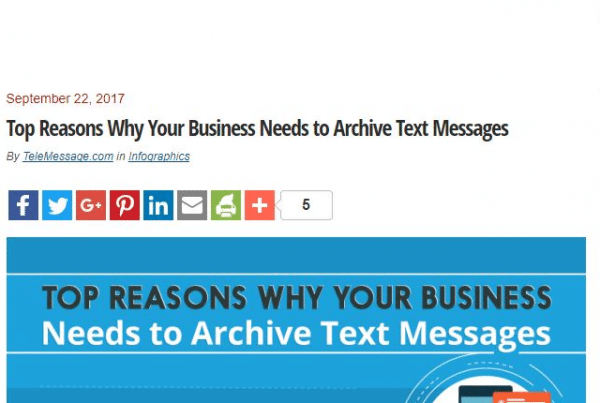With smartphones and chat apps being commonplace in most companies, the role of chief information officers (CIOs) today requires more than just managing the systems and processes that run the enterprise. CIOs are now also tasked with implementing a secure enterprise messaging platform, not only to avoid high-profile cybersecurity threats vectored through mobile devices but also to ensure effective and efficient compliance practices across their organization.
Since most employees carry a virtual computer in their pocket in the form of their smartphones, they can easily download consumer messaging apps that enable them to communicate with their co-workers, even though those apps may not be sanctioned and could throw the enterprise out of compliance.
With data security and regulatory compliance at the forefront of many current challenges facing businesses, it is only imperative for CIOs to understand what secure enterprise messaging options are available, and how implementing a reliable platform can effectively eliminate the risks of cyber-attacks and non-compliance.
Latest Threats in Enterprise Messaging
The biggest threat in enterprise messaging today is the prevalence of consumer messaging app such as WhatsApp and Telegram among employees. In one article from CIOP, Adam Preset, a research director with Gartner, says workers already use consumer messaging apps extensively in the enterprise because the popular tools are often effective and easy to use. “Our mobile devices suit our needs whether we’re on the clock or off,” he says.
But while convenient for employees, the unapproved use of consumer apps in the organization can create a huge security hole that threatens not only the business infrastructure but also the corporate regulatory compliance.
the most recent threat in enterprise messaging is mobile phishing. According to CSO, phishing is a “well-known and well-understood attack predicated on social engineering…”
For instance, a malicious individual may want to create a mechanism that will help them retrieve important data such as personal or financial records. To do this, they might use an email, text message, social post, or other method to lure a victim to a fake website where the victim unintentionally enters personal information for the attacker.
Here are few disturbing statistics from PhishLabs about phishing:
- In 2017, Phishing volume grew by an average of more than 33% across the five most-targeted industries.
- Attacks targeting government tax authorities have grown more than 300% since 2014.
- Ransomware attacks, the predominant type of malware being distributed via phishing, are now focusing on organizations that are more likely to pay ransoms, such as healthcare, government, critical infrastructure, education, and small businesses.
- The share of attacks against targets in the United States continues to grow, accounting for more than 81% of all phishing attacks.
For businesses, email, productivity, social media, messaging and travel apps all pose a particular risk to mobile phishing. A dangerous example of mobile phishing just happened recently, when several people received a forwarded WhatsApp message about Jet Airways seemingly offering free tickets to people.
The message claimed the airline was offering two free tickets to everyone to celebrate their 25th anniversary. The forward was accompanied by a link that directed people to the page supposedly offering the free tickets. However, before giving away the tickets, the page asked visitors to take a survey and also forward the same message to 20 of their friends.
Jet Airways then immediately issued a statement which they clearly mentioned that it is a fake alert and warned people to not fall into the scam. However, The free air ticket scam had gone viral on WhatsApp and Facebook, and many people fell prey to the phishing scam.
Aspects CIOs Must Look For in a Secure Enterprise Messaging Platform?
Beyond ensuring the security of corporate communications, a secure enterprise messaging solution also helps employees be more productive by providing them the appropriate tools and apps needed to perform tasks on their mobile devices.
The following are some of the features that CIOs should look for when investing in an enterprise messaging platform:
- Robust Security Measures – End-to-End Encryption, Self-Destruct Messaging, PIN Code Enforcement, Remote Lock and Wipe.
- Reliable Message Delivery – SMS Fallback, International Message Transmission, Message Delivery Confirmation.
- Ease of Use – Conversation-Based User Interface, Broad File Sharing Options.
- Administrative Access to All Accounts – Central Management and Administration, Message Archiving, Reporting Tools.
- Scalable Storage Technology – On-Premise, Cloud-Based, Hybrid Storage Options.
- Cross-Platform Support – iOS, Android, Web, Outlook
- Flexible Deployment – BYOD, CYOD, Company-Issued Devices.
- Compliance with Key Regulations – FINRA, SOX, HIPAA, HITECH Compliant.
Steps CIOs Must Take Before Implementing a Platform
Clearly, compliance and data security are the key drivers in today’s increasing need for a secure enterprise-grade messaging platform. However, in order to ensure an effective deployment, CIOs must first take the following steps:
1. Identify the messaging apps already being used in the workplace and where these apps are mostly used. This will help the IT department to identify which area possess the greatest risk to the business.
2. Develop selection criteria for choosing the right vendor. Prioritize security, compliance, file storage, admin control as these are the factors that most regulators look for in a secure and compliant communication platform.
3. Have a clear and obvious way to enforce or monitor policy compliance, including how employees communicate over text. For financial firms, it’s important that they have a text messaging policy in place to control the communication between their employees and investors.
By deploying an approved, secure enterprise text messaging solution, the enterprise can embrace the need to discuss sensitive matters via SMS text messaging. Today’s modern secure messaging solutions ensure that communications are secure, confidential and compliant to meet enterprise requirements. With a secure messaging platform, users can still leverage the convenience and instantaneous nature of texting, while accommodating the enterprise’s needs.
Contact us today to learn how TeleMessage can help you achieve 100% compliance with various mobile messaging regulations and keep your enterprise communicate safe and secure through our mobility solutions.


